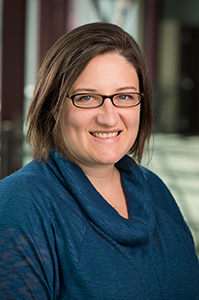Andrea Gingerich, ND, MMEd, PhD
Scholar
Andrea is a CHES Scholar and an assistant professor in the Division of Medical Sciences at the University of Northern British Columbia in Prince George. She obtained her PhD in health professions education in 2015 from Maastricht University under the supervision of Drs. Cees van der Vleuten, Kevin Eva and Glenn Regehr. Her dissertation challenged the rater idiosyncrasy explanation for error variance by identifying multiple clusters of consensus within physicians’ variable clinical assessment judgments of a given trainee. Andrea was awarded a masters degree in medical education with distinction through the University of Dundee in 2010 with a thesis focusing on assessment in problem-based learning. Her experience with facilitating small group learning activities at the Northern Medical Program extends back to 2006. Her teaching and research is informed by various former roles in healthcare including four years working as a licensed naturopathic doctor in rural Ontario.
Research Interests
Andrea’s research is driven by a fascination with how people think. Her curiosity was piqued by noticing variability in the assessment judgments made for a given medical trainee. Her studies revealed more than one point of view within the variability with many people aligning with each of those perspectives rather than everyone having their own idiosyncratic point of view. The initial search to better understand variable assessment judgments and ratings has led to multiple lines of research each investigating differing perspectives on a shared experience. It includes collaborative research identifying various dynamic supervision approaches used by physicians in clinical teaching units on internal medicine wards and ongoing research into physician supervisors’ understandings of trainee underperformance. Lines of research have also extended into studying how practitioners navigate ethical issues while living and practising in rural, northern, and remote communities given that the standards of conduct generated through urban practise may not be sufficient to guide their decisions. Assessment, clinical supervision, and professional practice are areas where Andrea studies variability in judgments by identifying and analyzing differing perspectives through a social cognition lens.
Grants
- Medical Education Research Grant, Royal College of Physicians and Surgeons of Canada (2020-2022). $19,850
- UBC Distributed Medical Education Grant, 2019. $10,000
- Strategic Initiative Grant, Royal College of Physicians and Surgeons of Canada (2019-2021). $29,877
- UBC Distributed Medical Education Grant, 2018. $10,000
- Medical Education Research Grant, Royal College of Physicians and Surgeons of Canada (2018-2020). $47,860
- Research in Clinical Assessment Grant, Medical Council of Canada (2018 – 2019). $30,971.25
- Stemmler Medical Education Research Fund, National Board of Medical Examiners (2012 – 2015). $78,306
Awards
- Association for Medical Education in Europe, Best Research Paper Award for Seeing but not believing: Insights into the intractability of failure to fail. (2020)
- Association for Medical Education in Europe, Best Research Paper Award for Beyond hands-on and hands-off: Supervisory approaches and entrustment on the inpatient ward. (2018)
- Canadian Association for Medical Education Research Award, Best Oral Presentation at the Canadian Conference on Medical Education (2015)
- Association of American Medical Colleges, Thomas Hale Ham Award for New Investigators (2012)
- Canadian Association of Medical Education, Certificate of Merit Award (2012)
Publication Highlights
Gingerich A, Van Volkenburg K, Maurice S, Simpson C, Roots R. (2021). Urban ideals and rural realities: physiotherapists navigating paradox in overlapping roles. Medical Education.
Ginsburg, S, C. J. Watling, DJ Schumacher, A Gingerich, R Hatala. (2021). Numbers Encapsulate, Words Elaborate: Toward the Best Use of Comments for Assessment and Feedback on Entrustment Ratings. Academic Medicine 96(7S): S81-S86.
Gilchrist T, Hatala R, Gingerich A. (2021). A collective case study of supervision and competence judgments on the inpatient internal medicine ward. Perspectives on Medical Education 10(3):155-162.
Gingerich A, Sebok-Syer SS, Larstone R, Watling CJ, Lingard, L. (2020) Seeing but not believing: Insights into the intractability of failure to fail. Medical Education 54(12): 1148-1158.
Hatala R, Ginsburg S, Hauer K, Gingerich A. (2019). Entrustment ratings in internal medicine training: capturing supervision decisions or just another rating? Journal of General Internal Medicine 34(5): 740-743.
Gingerich, A., Daniels, V., Farrell, L., Olsen, S., Kennedy, T., Hatala, R. (2018). Beyond hands-on and hands-off: Supervisory approaches and entrustment on the inpatient ward. Medical Education.
Gingerich, A., Ramlo, S.E, van der Vleuten, C.P.M., Eva, K.W., & Regehr, G. (2017). Inter-rater variability as mutual disagreement: Identifying raters’ divergent points of view. Advances in Health Sciences Education 22(4): 819-838.
Gingerich, A., (2015). Commentary: What if the ‘trust’ in entrustable were a social judgment? Medical Education 49:748-754.
Gingerich, A., Kogan, J., Yeates, P., Govaerts, M., & Holmboe, E. (2014). Seeing the ‘black box’ differently: assessor cognition from three research perspectives. Medical Education 48:1055-1068.
Gingerich, A., Regehr, G., & Eva, K. (2011). Rater-based assessments as social judgments: Rethinking the etiology of rater errors. Academic Medicine 86(10 Suppl):S1-S7.
